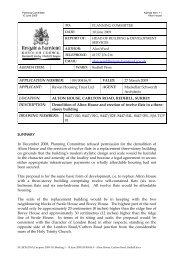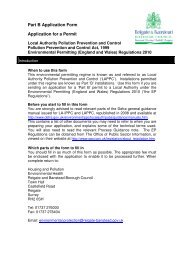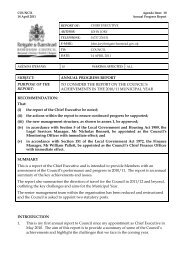Annual Audit Letter 2008/09 - Reigate and Banstead Borough Council
Annual Audit Letter 2008/09 - Reigate and Banstead Borough Council
Annual Audit Letter 2008/09 - Reigate and Banstead Borough Council
- No tags were found...
You also want an ePaper? Increase the reach of your titles
YUMPU automatically turns print PDFs into web optimized ePapers that Google loves.
PUBLIC SECTOR<strong>Annual</strong> <strong>Audit</strong><strong>Letter</strong> <strong>2008</strong>/<strong>09</strong><strong>Reigate</strong> <strong>and</strong> <strong>Banstead</strong><strong>Borough</strong> <strong>Council</strong>AUDIT
ContentThe contacts at KPMG inconnection with this report are:Neil ThomasPartnerKPMG LLP (UK)Tel: 020 7311 1379Mob: 078990 64962Neil.thomas@kpmg.co.ukFleur NieboerSenior ManagerKPMG LLP (UK)Tel: 020 7311 1897Mob: 077684 85532fleur.nieboer@kpmg.co.ukPageExecutive summary 2Use of resources 4Financial statements 6Appendices 71. Key recommendations2. Reports issuedEmma FoyManagerKPMG LLP (UK)Tel: 020 7694 5707Mob: 077791 20156emma.foy@kpmg.co.ukThis report is addressed to the <strong>Council</strong> <strong>and</strong> has been prepared for the sole use of the Authority.We take no responsibility to any member of staff acting in their individual capacities, or to thirdparties. The <strong>Audit</strong> Commission has issued a document entitled Statement of Responsibilities of<strong>Audit</strong>ors <strong>and</strong> <strong>Audit</strong>ed Bodies. This summarises where the responsibilities of auditors begin <strong>and</strong>end <strong>and</strong> what is expected from the audited body. We draw your attention to this document.External auditors do not act as a substitute for the audited body’s own responsibility for puttingin place proper arrangements to ensure that public business is conducted in accordance with thelaw <strong>and</strong> proper st<strong>and</strong>ards, <strong>and</strong> that public money is safeguarded <strong>and</strong> properly accounted for, <strong>and</strong>used economically, efficiently <strong>and</strong> effectively.If you have any concerns or are dissatisfied with any part of KPMG’s work, in the first instanceyou should contact Neil Thomas, who is the engagement partner to the Authority, telephone 0292046 8205, email neil.thomas@kpmg.co.uk who will try to resolve your complaint. If you aredissatisfied with your response please contact Trevor Rees on 0161 236 4000, emailtrevor.rees@kpmg.co.uk, who is the national contact partner for all of KPMG’s work with the<strong>Audit</strong> Commission After this, if you are still dissatisfied with how your complaint has beenh<strong>and</strong>led you can access the <strong>Audit</strong> Commission’s complaints procedure. Put your complaint inwriting to the Complaints Investigation Officer, Westward House, Lime Kiln Close, Stoke Gifford,Bristol, BS34 8SR or by e mail to: complaints@audit-commission.gov.uk. Their telephone numberis 0844 798 3131, textphone (minicom) 020 7630 0421© 20<strong>09</strong> KPMG LLP, a UK limited liability partnership, is a subsidiary of KPMG Europe LLP <strong>and</strong> a member firm of the KPMG network of independent memberfirms affiliated with KPMG International, a Swiss cooperative. All rights reserved. This document is confidential <strong>and</strong> its circulation <strong>and</strong> use are restricted. KPMG<strong>and</strong> the KPMG logo are registered trademarks of KPMG International, a Swiss cooperative. The Concordat logo is reproduced by permission of the <strong>Audit</strong>Commission. KPMG LLP is not a signatory to the Concordat but supports the broad principles that are promoted by the Concordat.1
Section oneExecutive SummaryPurposeThis <strong>Annual</strong> <strong>Audit</strong> <strong>Letter</strong> (the <strong>Letter</strong>) summarises the key issues arising from our <strong>2008</strong>/<strong>09</strong> audit at <strong>Reigate</strong> <strong>and</strong><strong>Banstead</strong> <strong>Borough</strong> <strong>Council</strong> (the <strong>Council</strong>). Although this <strong>Letter</strong> is addressed to the Members of the <strong>Council</strong>, it isalso intended to communicate these issues to key external stakeholders, including members of the public. The<strong>Letter</strong> will also be published on the <strong>Audit</strong> Commission website at www.audit-commission.gov.uk. It is theresponsibility of the <strong>Council</strong> to publish the letter on its website at www.reigate-banstead.gov.uk. Throughout ouraudit we have highlighted areas of good performance <strong>and</strong> also provided recommendations to help you improveperformance. A summary of our key recommendations is set out in Appendix 1. We have reported all theconclusions in this letter to you throughout the year <strong>and</strong> a list of all reports we have issued is provided in Appendix2.Scope of our auditThe statutory responsibilities <strong>and</strong> powers of appointed auditors are set out in the <strong>Audit</strong> Commission Act 1998. Ourmain responsibility is to carry out an audit that meets the requirements of the <strong>Audit</strong> Commission’s Code of <strong>Audit</strong>Practice (the Code) which requires us to review <strong>and</strong> report on your:• use of resources - whether you have made proper arrangements for securing economy, efficiency <strong>and</strong>effectiveness (value for money) in your use of resources (UoR). Our work is summarised in section 2; <strong>and</strong>• accounts – the Financial Statements <strong>and</strong> the <strong>Annual</strong> Governance Statement, summarised in section 3.Key Messages• Our use of resources assessment, the first under the <strong>Audit</strong> Commission’s new UoR regime, demonstratedthat the <strong>Council</strong> had sound processes in place for all elements of the assessment. Scores of level three(‘performing well’) were achieved in respect of the ‘Managing Finance’ <strong>and</strong> ‘Governing the Business’ <strong>and</strong> a leveltwo (‘performing adequately’) in respect of ‘Managing Resources’. We concluded that the <strong>Council</strong> had madeproper arrangements to secure economy, efficiency <strong>and</strong> effectiveness in its use of resources. Our value formoney conclusion was therefore unqualified.• We issued an unqualified opinion in respect of the audit of the accounts. Some material amendments wererequired in relation to the treatment of accumulated depreciation <strong>and</strong> ‘no added value’ assets in the accounts.However, these had no impact on the general fund <strong>and</strong> were not considered to significantly impact on thereader’s interpretation of the accounts.FeesOur fee for all audit, grants <strong>and</strong> use of resources work in <strong>2008</strong>/<strong>09</strong> was £127,473. This has been contained withinthe fee agreed with you in our audit plan.Future Issues• From 2010/11, local government bodies are required to prepare their financial statements under InternationalFinancial Reporting St<strong>and</strong>ards (IFRS), which contain a number of significant differences from the currentfinancial reporting regime. The <strong>Council</strong> has started preparing for this transition, although as with all localauthorities there remains much to be done to identify the full impact of IFRS on its accounting arrangements<strong>and</strong> to make the necessary changes.• Those local authorities in the Carbon Reduction Commitment scheme will need to start reporting their usagefrom 1 April 2010 <strong>and</strong> recording these transactions within their financial statements with effect from 1 April2011. There will be implications for cash flow, energy bills, <strong>and</strong> investment decisions <strong>and</strong> these could besignificant. There are opportunities in addressing sustainability with clear cost reduction benefits from savingenergy which will become more significant over time. There are also opportunities to use the sustainabilityagenda to support the achievement of business challenges. It puts carbon reduction firmly amongst the priorityareas for local authorities, with the opportunities outlined above applying even for those authorities who are notcaptured by the scheme.© 20<strong>09</strong> KPMG LLP, a UK limited liability partnership, is a subsidiary of KPMG Europe LLP <strong>and</strong> a member firm of the KPMG network of independent memberfirms affiliated with KPMG International, a Swiss cooperative. All rights reserved. This document is confidential <strong>and</strong> its circulation <strong>and</strong> use are restricted. KPMG<strong>and</strong> the KPMG logo are registered trademarks of KPMG International, a Swiss cooperative. The Concordat logo is reproduced by permission of the <strong>Audit</strong>Commission. KPMG LLP is not a signatory to the Concordat but supports the broad principles that are promoted by the Concordat.2
Section oneExecutive Summary (continued)Future Issues (cont)• Sustainability performance - The Treasury is developing guidance for 2010/2011 which will require all publicsector bodies to report publicly on sustainability performance in annual reports. CIPFA is in discussion with theTreasury about when <strong>and</strong> in what form this requirement will be formalised for local authorities. The reportedinformation will be subject to audit <strong>and</strong> scrutiny. Sustainability reporting will be difficult to implement <strong>and</strong> manyorganisations will need to act quickly to implement new information gathering processes.• Public expenditure forecasts indicate that there will be significant pressure on local authorities’ funding in themedium term. Future financial settlements will be tight, increasing the need for local authorities to havecomprehensive efficiency programmes supported by sound financial management arrangements. The <strong>Council</strong>will need to carefully consider what action it takes to ensure that sufficient savings <strong>and</strong> efficiencies areachieved to mitigate the impact on services provided. More than ever before, officers <strong>and</strong> Members will needto focus on identifying these significant savings measures <strong>and</strong> ensuring that robust arrangements are in placeto monitor their delivery to ensure they are realised. The <strong>Council</strong> has a good track record in delivering suchefficiency <strong>and</strong> savings targets. It will, however, be necessary to continually assess <strong>and</strong> update the <strong>Council</strong>’splans to ensure that you can deliver the levels of savings required for the future, particularly as pressureincreases to minimise council tax rises.AcknowledgementWe would like to thank the <strong>Council</strong>’s management <strong>and</strong> staff for the help, support <strong>and</strong> co-operation they haveprovided throughout our audit.© 20<strong>09</strong> KPMG LLP, a UK limited liability partnership, is a subsidiary of KPMG Europe LLP <strong>and</strong> a member firm of the KPMG network of independent memberfirms affiliated with KPMG International, a Swiss cooperative. All rights reserved. This document is confidential <strong>and</strong> its circulation <strong>and</strong> use are restricted. KPMG<strong>and</strong> the KPMG logo are registered trademarks of KPMG International, a Swiss cooperative. The Concordat logo is reproduced by permission of the <strong>Audit</strong>Commission. KPMG LLP is not a signatory to the Concordat but supports the broad principles that are promoted by the Concordat.3
Section threeFinancial statements<strong>Audit</strong> opinionWe issued an unqualified opinion on your accounts on 16 October 20<strong>09</strong>. This means that we believe the accountsgive a true <strong>and</strong> fair view of the financial affairs of the <strong>Council</strong> <strong>and</strong> of the income <strong>and</strong> expenditure recorded duringthe year.Before we give our opinion on the accounts, we are required to report to ‘those charged with governance’ anysignificant matters identified. We did this in our report to the <strong>Audit</strong> <strong>and</strong> Performance Review Panel meeting on 15October 20<strong>09</strong> <strong>and</strong> the key issues are summarised here.Accounts production <strong>and</strong> adjustments to the accounts• We received a complete set of draft accounts on the 29 June before the 30 June deadline. The working papersyou provided for the accounts audit were of good quality.• Our audit identified one material adjustment that impacted on your reported outturn. This related to theimpairment of your investment in L<strong>and</strong>sbanki. Guidance was issued after you had completed your draftaccounts which resulted in an increase in the impairment of £1m. You were able to take advantage of theCapital Finance Regulations to partially defer the impact of the impairment of the General Fund which wasreduced by £700K to £3m.• We also identified two material adjustments which were presentational. The first related to the reclassificationof a provision totalling £1.5m to an earmarked reserve. The second related to a £700K reclassification of shortterm investments to cash. We identified a number of minor audit differences, all of which were adjusted for by<strong>Council</strong> management.• Our audit resulted in five recommendations regarding financial controls <strong>and</strong> governance.There were no other issues raised for the attention of the Executive.© 20<strong>09</strong> KPMG LLP, a UK limited liability partnership, is a subsidiary of KPMG Europe LLP <strong>and</strong> a member firm of the KPMG network of independent memberfirms affiliated with KPMG International, a Swiss cooperative. All rights reserved. This document is confidential <strong>and</strong> its circulation <strong>and</strong> use are restricted. KPMG<strong>and</strong> the KPMG logo are registered trademarks of KPMG International, a Swiss cooperative. The Concordat logo is reproduced by permission of the <strong>Audit</strong>Commission. KPMG LLP is not a signatory to the Concordat but supports the broad principles that are promoted by the Concordat.5
AppendicesAppendix 1: Key recommendationsThis appendix summarises the main recommendations that we identified during <strong>2008</strong>/<strong>09</strong>, along with your responseto them. Only high <strong>and</strong> medium priority recommendations have been included here. The low priorityrecommendations are contained, as appropriate, in our audit reports (which are listed in Appendix 2).Issue/ RecommendationFinancial statements auditRegister of interests (high priority)During the course of our audit we noted that not all members’declarations of interest had been returned on a timely basis <strong>and</strong> inorder for us to complete our audit work <strong>and</strong> be in a position toprovide our audit opinion, <strong>Council</strong> officers were required to rerequestthese declarations. Given the increasing emphasis in thepublic sector for self certification of governance procedurescoupled with the increased scrutiny over these procedures it isessential that the <strong>Council</strong> can demonstrate that the processes inplace to mitigate against the risk of conflict of interest areoperating effectively throughout the year.The return of the declarations is a key control <strong>and</strong> one for whichno compensating controls can be put in place. It is therefore vitalthat the <strong>Council</strong> <strong>and</strong> members ensure that all forms are completed<strong>and</strong> returned on a timely basis in 20<strong>09</strong>-10.<strong>Annual</strong> Governance Statement (medium priority)As part of our audit of the financial statements we review theannual governance statement <strong>and</strong> consider whether it reflects theprocesses in place at the <strong>Council</strong>. Whilst we are satisfied thatthere are no inconsistencies in the statement we do consider thatthe significant issues identified do not clearly articulate the extentto which the <strong>Council</strong> is exposed to risk. For example the controlweaknesses identified as part of the Licensing <strong>Audit</strong> had led to anincome misstatement of c£200. As this is not quantified withinthe statement it is difficult to gain assurance over the seriousnessof the risks identified.We are therefore recommending that for 20<strong>09</strong>-10 you review thecontent <strong>and</strong> ensure all significant issues included are clearly linkedto risks that the organisation faces. We will provide you withexamples to help facilitate the process.<strong>Annual</strong> review of provisions (medium priority)Our audit identified a balance of £1.5m included within provisionsthat relates to a reserve created to help offset the cost ofpensions relating to employees made redundant. We haverecommended that the balance is reclassified as an earmarkedreserve <strong>and</strong> that the <strong>Council</strong> ensures all provisions are reviewedannually to confirm they meet the criteria of FRS12.There has been some difficulty in obtaining returns fromsome Members. Additional effort will be put intoexplaining the importance of these returns. This effortwill include closer work with Group LeadersChief ExecutiveSeptember 2010We will take this comment on board <strong>and</strong> improve thenext <strong>Annual</strong> Governance StatementChief ExecutiveMarch 2010Management Response /Timescale for implementationAccepted <strong>and</strong> actioned for <strong>2008</strong>/<strong>09</strong> accountsDirector of ResourcesSeptember 20<strong>09</strong>© 20<strong>09</strong> KPMG LLP, a UK limited liability partnership, is a subsidiary of KPMG Europe LLP <strong>and</strong> a member firm of the KPMG network of independent memberfirms affiliated with KPMG International, a Swiss cooperative. All rights reserved. This document is confidential <strong>and</strong> its circulation <strong>and</strong> use are restricted. KPMG<strong>and</strong> the KPMG logo are registered trademarks of KPMG International, a Swiss cooperative. The Concordat logo is reproduced by permission of the <strong>Audit</strong>Commission. KPMG LLP is not a signatory to the Concordat but supports the broad principles that are promoted by the Concordat.6
AppendicesAppendix 1: Key recommendations (continued)Issue/ RecommendationUse of Resources auditManaging Finances – KLOE 1.2 (high priority)The <strong>Council</strong> has recently launched the ‘sourcing strategy’ to helpgenerate more efficient working practices. We arerecommending that as part of this work you consider how youmight develop shared service options over the next twelvemonths to help achieve greater economies of scale.We are also recommending that the intended outcomes – bothfinancial <strong>and</strong> operational are clearly stated <strong>and</strong> supported byaction plans to track progress.Governing the Business – KLOE 2.4 (high priority)We are aware through our work <strong>and</strong> through areas of concernhighlighted in the <strong>Council</strong>’s <strong>Annual</strong> Governance Statement thatrisk management processes within services are not fullyintegrated with other monthly performance monitoringprocesses.In order to further embed risk management <strong>and</strong> to ensure thatprocesses are operating effectively we are recommending thatthe local risk registers that exist are integrated with serviceperformance management. We recommend that the top tenrisks from local risks registers are reported <strong>and</strong> movements inrating clearly documented <strong>and</strong> understood.Managing Resources – KLOE 3.3 (high priority)Whilst the <strong>Council</strong> draws up annual HR plans <strong>and</strong> conductscyclical reviews of services from a staffing <strong>and</strong> HR perspectivethere is no overarching workforce plan.We are recommending that a workforce plan is developed thatcovers the short, medium <strong>and</strong> long term strategic direction of the<strong>Council</strong>.It is important that this incorporates clear succession planning<strong>and</strong> that it considers the changing shape of services so thatorganisational change can be proactive <strong>and</strong> better support theorganisation’s objectives.Governing the Business – KLOE 2.1 (medium priority)In order to continue to demonstrate how the <strong>Council</strong> influences<strong>and</strong> develops the supply market it is important that your futureoutsourcing strategy builds on some of the procurementnetworks you have established in Surrey <strong>and</strong> on some of thediscussions you have had with <strong>Council</strong>s from other localitiesregarding shared services.We believe it is important that over the next year the <strong>Council</strong> setsa target of savings to be achieved through joint procurementventures <strong>and</strong> through shared service arrangements in order tohelp ensure that more radical efficiencies are made. We areaware that you have set a target of £1m for 20<strong>09</strong>-10 in relation toalternative service delivery which will help ensure this isachieved.Management Response /Timescale for implementationAll aspects of the recommendation will be taken intoaccount as we continue to work on the sourcing strategy.Options Evaluation criteria are to be agreed at the JanuaryExecutive followed by approval of preferred options.Director of Services to the CommunityDirector of ResourcesAn action plan to be produced <strong>and</strong> agreed by the end ofApril 2010. Implementation of improvements willcommence from May 2010.Director of ResourcesAn action plan will be produced by March 2010. We willcarry out gap analysis against best practice <strong>and</strong> ensurethat the plan reflects the <strong>Council</strong>’s sourcing strategy.Director of ResourcesAll aspects of the recommendation will be taken intoaccount as we continue to work on the sourcing strategy.Options Evaluation criteria are to be agreed at the JanuaryExecutive followed by approval of preferred options.Director of Services to the CommunityDirector of Resources© 20<strong>09</strong> KPMG LLP, a UK limited liability partnership, is a subsidiary of KPMG Europe LLP <strong>and</strong> a member firm of the KPMG network of independent memberfirms affiliated with KPMG International, a Swiss cooperative. All rights reserved. This document is confidential <strong>and</strong> its circulation <strong>and</strong> use are restricted. KPMG<strong>and</strong> the KPMG logo are registered trademarks of KPMG International, a Swiss cooperative. The Concordat logo is reproduced by permission of the <strong>Audit</strong>Commission. KPMG LLP is not a signatory to the Concordat but supports the broad principles that are promoted by the Concordat.7
AppendicesAppendix 1: Key recommendations (continued)Management Response /Issue/ RecommendationTimescale for implementationUse of Resources audit (continued)Governing the Business – KLOE 2.2 (medium priority) Projects documents will be reviewed <strong>and</strong> revised inOur review looked at areas such as the Village ImprovementJanuary 2010scheme which was well thought out, supported by wide Monitoring of outcomes will be part of the project closureconsultation <strong>and</strong> in line with stated priorities. We were however reviews that will take place from 2010 onwards.unable to assess the outcomes as the relevant data had not beenChief Executivecaptured.To better support the achievements of local plans we arerecommending that when setting targets for projects the <strong>Council</strong>also considers how success will be measured <strong>and</strong> how thisinformation will be captured.We are recommending that this is outlined in all projectspecifications so that outcomes can be routinely assessed, usedfor comparisons <strong>and</strong> reported.Governing the Business – KLOE 2.3 (medium priority) This has been incorporated into the CAA ImprovementConsiderable work has gone into the development <strong>and</strong> launch ofPlan <strong>and</strong> will be subject to quarterly monitoring from nowthe <strong>Council</strong>’s Local Code of Corporate Governance.on.Whilst each principle is underpinned by an action plan for deliveryChief Executivewe are recommending that these are routinely monitored <strong>and</strong>that progress is reported each quarter to ensure that the impactof each work stream can be clearly demonstrated.Governing the Business – KLOE 2.4 (medium priority)In order to ensure that you are maximising the <strong>Council</strong>’s areas ofstrength <strong>and</strong> areas of priority we are recommending that from20<strong>09</strong>-10 onwards your risk management arrangements routinelycapture opportunities as well as risks.These should focus on your corporate priorities such as thesustainability agenda <strong>and</strong> consider how you can build onsuccesses such as the water harvesting scheme <strong>and</strong> the recordsmanagement system to drive out further efficiencies or bring innew revenue streams.An action plan to be produced <strong>and</strong> agreed by the end ofApril 2010. Implementation of improvements willcommence from May 2010.Director of Resources© 20<strong>09</strong> KPMG LLP, a UK limited liability partnership, is a subsidiary of KPMG Europe LLP <strong>and</strong> a member firm of the KPMG network of independent memberfirms affiliated with KPMG International, a Swiss cooperative. All rights reserved. This document is confidential <strong>and</strong> its circulation <strong>and</strong> use are restricted. KPMG<strong>and</strong> the KPMG logo are registered trademarks of KPMG International, a Swiss cooperative. The Concordat logo is reproduced by permission of the <strong>Audit</strong>Commission. KPMG LLP is not a signatory to the Concordat but supports the broad principles that are promoted by the Concordat.8
AppendicesAppendix 2: <strong>Audit</strong> reports issuedA summary of the reports issued in the year to date is set out below.Report<strong>Audit</strong> <strong>and</strong> Inspection Plan <strong>2008</strong>/<strong>09</strong>Report to those charged with governance (ISA 260)<strong>Annual</strong> <strong>Audit</strong> <strong>Letter</strong>DateJune <strong>2008</strong>September 20<strong>09</strong>December 20<strong>09</strong>© 20<strong>09</strong> KPMG LLP, a UK limited liability partnership, is a subsidiary of KPMG Europe LLP <strong>and</strong> a member firm of the KPMG network of independent memberfirms affiliated with KPMG International, a Swiss cooperative. All rights reserved. This document is confidential <strong>and</strong> its circulation <strong>and</strong> use are restricted. KPMG<strong>and</strong> the KPMG logo are registered trademarks of KPMG International, a Swiss cooperative. The Concordat logo is reproduced by permission of the <strong>Audit</strong>Commission. KPMG LLP is not a signatory to the Concordat but supports the broad principles that are promoted by the Concordat.9


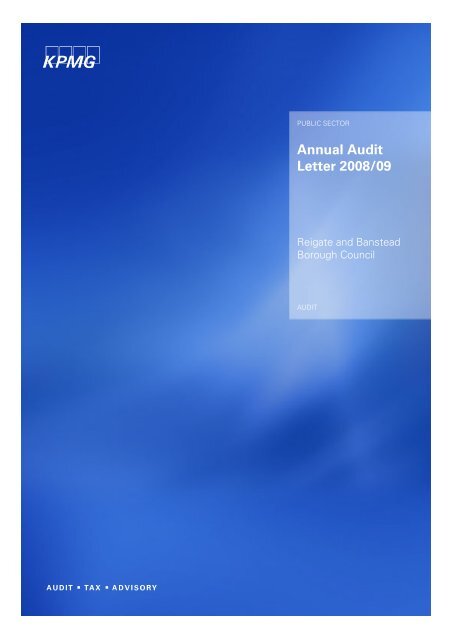
![Application form to register a food premises (PDF document [34.4Kb])](https://img.yumpu.com/51084892/1/184x260/application-form-to-register-a-food-premises-pdf-document-344kb.jpg?quality=85)
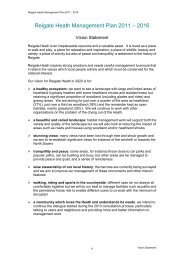
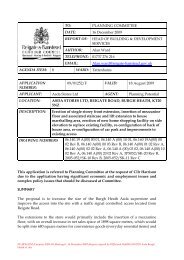

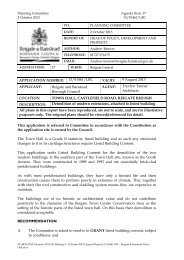
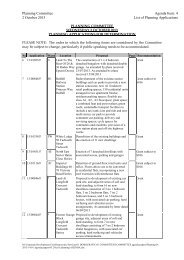
![Operator's application form (PDF document [44.7Kb]) - Reigate and ...](https://img.yumpu.com/37759022/1/184x260/operators-application-form-pdf-document-447kb-reigate-and-.jpg?quality=85)


